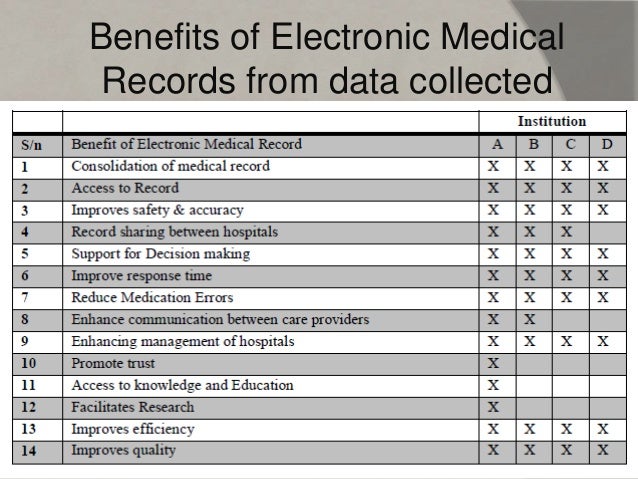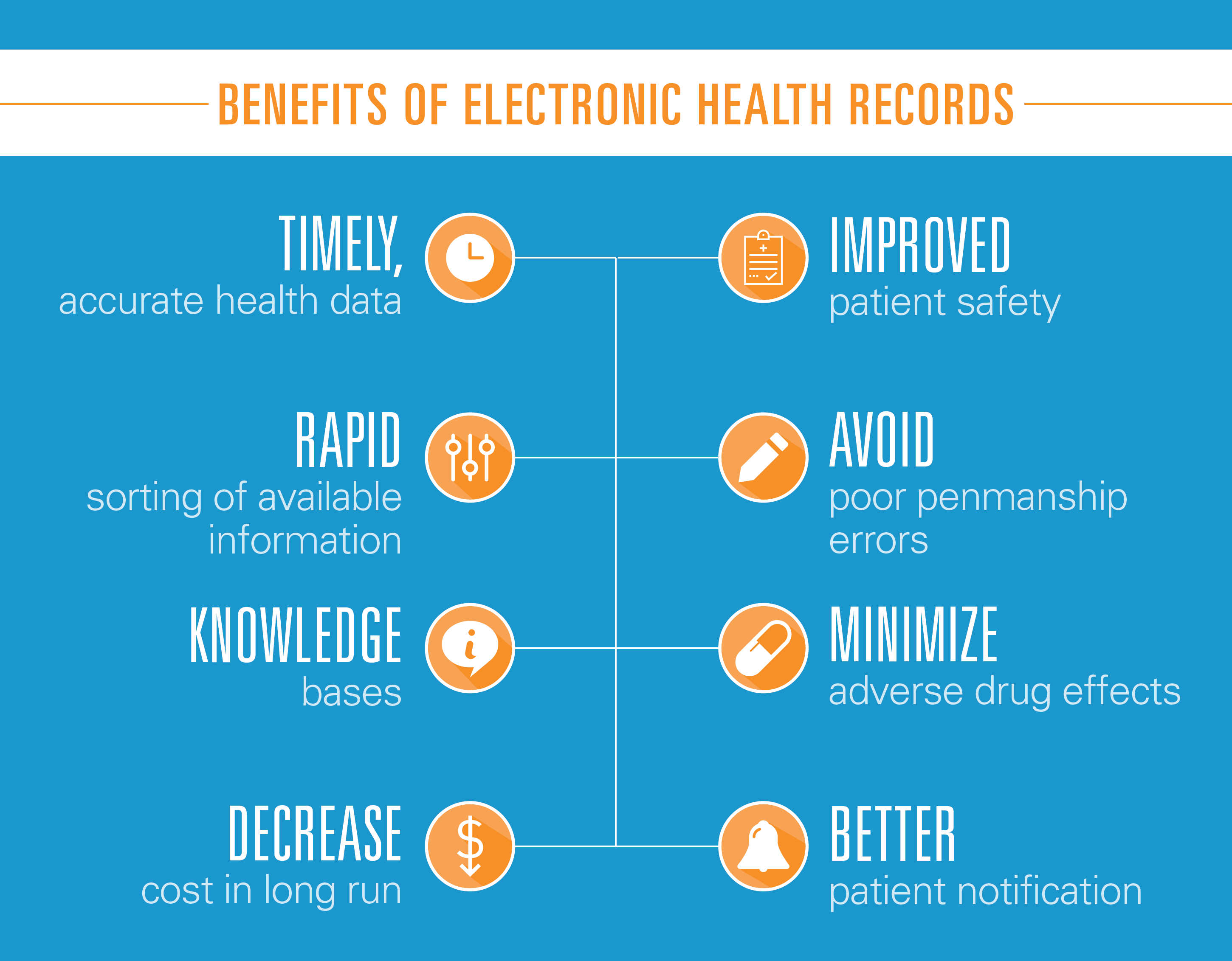An electronic health record (ehr) is more than a digital version of a patient’s paper chart. ehrs are real-time, patient-centered records that make information available instantly and securely to authorized users. while an ehr does contain the medical and treatment histories of patients, an ehr system is built to go beyond standard clinical data collected in a provider’s office and can be. One of the biggest reasons senior citizens end up in the hospital is because of a fall in the home. if you’re worried about losing your independence, then a medical alert system can help. you may have heard them being referred to as persona. Electronichealthrecord keeping will also allow healthcare providers to detect patterns and share information in ways that were not previously possible, and that can lead to faster, more effective cures. 1 charles, d. gabriel, m. searcy t. adoption of electronic health record systems among u. s. non-federal acute care hospitals: 2008-2014. Current and future benefits of electronic health records. as health care continues to evolve, so likely will the future scope and benefits of electronic health records. making health care more affordable. advances in telehealth have already enabled individuals to access a wider range of care in a more affordable and convenient manner. instead.
One of the main benefits of electronic medical records is that they can be shared with other professionals almost instantaneously via electronic transmission or direct access to a storage system. The benefits of an electronic medical record (emr) system. patient medical records are the backbone of providing top quality medical services. they are necessary to provide medical practitioners with a detailed background of a patient, enabling them to give the appropriate advice and treatment. Compared to electronic medical records (emr), which are electronic paper charts for a patient within a particular physician’s office, electronic health records go above and beyond. ehr is meant to give information about the patient’s health history beyond a single clinical setting to give a broader scope of the patient’s health care. In the last decade, medical practices, regardless of size and medical specialty, are using medical software to manage their patients and care providers. as a result, the benefits of electronic health records (ehr) are becoming more well understood, and the use of benefits of electronic medical record systems ehr software is on the rise. this jump in adoption is because there.
Electronic medicalrecord (emr) systems, defined as "an electronic record of health-related information on an individual that can be created, benefits of electronic medical record systems gathered, managed, and consulted by authorized clinicians and staff within one health care organization," have the potential to provide substantial benefits to physicians, clinic practices, and health. Key advantages better quality of care. ehr help provide better care for their patients by enabling quick access to patient records, more accurate patient information. originally introduced as an alternative to paper medical records, to make storing and interoperability. ehr interface with. Electronic medical record implementation will allow your health records to be in one digital file. learn about electronic medical record implementation. advertisement schoolchildren in the united states are often threatened with an ominous-.

Perceived benefits of implementing and using hospital.
Electronichealthrecords are beneficial in numerous ways. both large and small physician practices are rapidly switching to electronic health records from paper charts. with the implementation of the electronic health record system, it becomes easier for healthcare providers to manage patient records and optimize their clinical processes. Hospital information systems (his) and electronic medical records (emr) are currently considered a major part of the healthcare system, on which all the processes of care delivery depend. they have the potential benefits of electronic medical record systems to provide substantial benefits to healthcare professionals, patients and healthcare organizations.
The Benefits And Challenges Of Electronic Health Records
Success, apprehension, satisfaction, struggle—all describe obgyns’ experience with emr. part 2 of 2. william g. bates, md, mbaclinical professor of obstetrics and gynecology, vanderbilt university medical center, nashville, tenn. david b. h. An electronic health records system of information eliminates the problem of lost and/or misplaced patient files while also naturally eliminating data errors that can occur from transcription. according to experts, the advantages of emergency health records produce a marked increase in the health-related safety of patients. ehr benefits breakdown. Electronichealthrecordsystems are not cheap. medical facilities must invest a considerable amount, often measured in millions of dollars, to setup, maintain, and train people on an ehr. system updates may have a cost to them. many facilities need to hire it professionals or outsource their tech needs to keep the system running as effectively.
Ehrs are particularly beneficial to individuals in rural communities and can help individuals residing there become more health conscious. healthit. gov notes that the efficiency and cost-saving benefits of ehrs include “improved patient health/quality of care through better disease management and patient education. ”. Electronic document submissions enabled by an emr system ensures insurance companies and other healthcare providers to receive claims faster, in turn allowing faster service for clients and faster payments to doctors. the use of electronic documents also ensures increased collections as files benefits of electronic medical record systems are not lost or misplaced. improved quality of care.
Voices of experience weigh in: do electronic medical records make for a better practice? mdedge obgyn.
5 Benefits Of Electronic Medical Records Howstuffworks


Since the passage of the health information technology for economic and clinical health (hitech) act in 2009, advancements in technology for electronic health records (ehrs) have dramatically increased. 1 hitech includes incentives that provide reimbursements to hospitals and healthcare provider practices for adopting benefits of electronic medical record systems certified ehr technology and meeting meaningful use requirements. 2.
Electronichealthrecords Ehr Features Benefits And
Ehr benefits breakdown less paperwork and fewer storage issues in the healthcare industry, administrative duties represent a significant amount increased quality of care ehrs provide the ability to exchange complete health information about a patient in real time. financial incentives procuring. Electronichealthrecords alleviate the problems of lost files and missed communications, which were more prevalent with paper-based methods of record-keeping. with the ability to view previous care plans, tests, and treatments, there is a lower chance of wasted time and resources repeating an unnecessary test or procedure.
The risks and benefits of electronic health records. hans bruhn, mhs omic senior risk management specialist as the use of electronic health record (ehr) systems continues to rise, so do concerns about how their use may affect patient safety and medical professional liability. Your private medical record is not as private as you may think. here are the people and organizations that can access it and how they use your data. in the united states, most people believe that health insurance portability and accountabil. There are a few benefits of electronic medical records. see reasons why paper records will be phased out due to the benefits of electronic medical records. advertisement medical professionals in the united states have invested in some of th.

Medical professionals in the united states have invested in some of the most advanced diagnostic equipment in the world, but when it comes to keeping track of patients' medical histories, doctors and hospitals still rely primarily on pen and paper. members of both political parties champion converting all of that paperwork into a comprehensive system of electronic medical records, and the. 9. institute of medicine. “key capabilities of an electronic health record system. ” 10. goldschmidt, peter g. “hit and mis: implications of health information technology and medical information systems. ” 11. healthcare financial management association. “overcoming barriers to electronic health record adoption. ”. The benefits of electronic health records include: better health care by improving all aspects of patient care, including safety, effectiveness, patient-centeredness, better health by encouraging healthier lifestyles in the entire population, including increased physical activity, improved.

It’s a patient’s right to view his or her medical records, receive copies of them and obtain a summary of the care he or she received. the process for doing so is straightforward. when you use the following guidelines, you can learn how to. Eliza pacis, an air force nurse assigned to the 62nd medical brigade, trains on new electronic records to follow service members from through defense department clinics, va medical appointments and even health visits outside the federal systems. Your electronic health data: understanding the different records, systems and how they connect clarisezoleta courtesy of tracie risling, university of saskatchewan many canadians are not connected to their electronic health information. but.